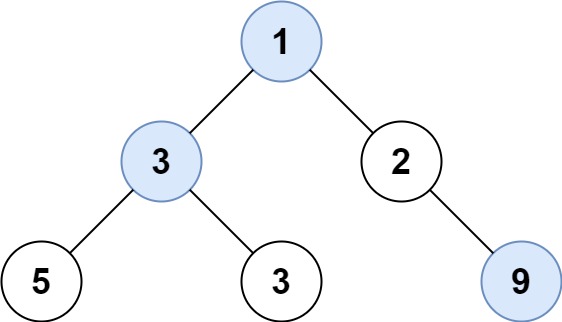Algorithm
Problem Name: 515. Find Largest Value in Each Tree Row
Given the root of a binary tree, return an array of the largest value in each row of the tree (0-indexed).
Example 1:

Input: root = [1,3,2,5,3,null,9] Output: [1,3,9]
Example 2:
Input: root = [1,2,3] Output: [1,3]
Constraints:
- The number of nodes in the tree will be in the range
[0, 104]. -231 <= Node.val <= 231 - 1
Code Examples
#1 Code Example with C++ Programming
Code -
C++ Programming
// BFS
class Solution {
public:
vector<int> largestValues(TreeNode* root) {
if(!root) return {};
vector<int>res;
deque < TreeNode*>cur, next;
cur.push_back(root);
int val = INT_MIN;
while(!cur.empty()){
auto p = cur.front();
cur.pop_front();
if(p->left) next.push_back(p->left);
if(p->right) next.push_back(p->right);
val = max(val, p->val);
if(cur.empty()){
swap(cur, next);
res.push_back(val);
val = INT_MIN;
}
}
return res;
}
};
// DFS
class Solution {
public:
vector<int> largestValues(TreeNode* root) {
vector<int>res;
DFS(root, res, 0);
return res;
}
void DFS(TreeNode* root, vector<int>& res, int level){
if(!root) return;
if(res.size() == level) res.push_back(root->val);
res[level] = max(res[level], root->val);
DFS(root->left, res, level + 1);
DFS(root->right, res, level + 1);
}
};
Input
Output
#2 Code Example with Java Programming
Code -
Java Programming
class Solution {
public List largestValues(TreeNode root) {
List list = new ArrayList<>();
if (root == null) {
return list;
}
Queue < TreeNode> queue = new LinkedList<>();
queue.add(root);
while (!queue.isEmpty()) {
int maxVal = Integer.MIN_VALUE;
int size = queue.size();
while (size-- > 0) {
TreeNode removed = queue.remove();
maxVal = Math.max(maxVal, removed.val);
if (removed.left != null) {
queue.add(removed.left);
}
if (removed.right != null) {
queue.add(removed.right);
}
}
list.add(maxVal);
}
return list;
}
}
Input
Output
#3 Code Example with Javascript Programming
Code -
Javascript Programming
const largestValues = function(root) {
const res = [];
single(root, 0, res);
return res;
};
function single(node, row, arr) {
if (node == null) {
return null;
}
if (row < arr.length) {
if (node.val > arr[row]) {
arr[row] = node.val;
}
} else {
arr[row] = node.val;
}
single(node.left, row + 1, arr);
single(node.right, row + 1, arr);
}
Input
Output
#4 Code Example with Python Programming
Code -
Python Programming
class Solution:
def largestValues(self, root):
"""
:type root: TreeNode
:rtype: List[int]
"""
from collections import deque
q, res, target = deque([root]) if root else None, [root.val] if root else [], root
while q:
node = q.popleft()
if node.left: q.append(node.left)
if node.right: q.append(node.right)
if node == target and q:
res.append(max([i.val for i in q]))
target = q[-1]
return res
Input
Output
#5 Code Example with C# Programming
Code -
C# Programming
using System;
using System.Collections.Generic;
namespace LeetCode
{
/**
* Definition for a binary tree node.
* public class TreeNode {
* public int val;
* public TreeNode left;
* public TreeNode right;
* public TreeNode(int val=0, TreeNode left=null, TreeNode right=null) {
* this.val = val;
* this.left = left;
* this.right = right;
* }
* }
*/
public class _0515_FindLargestValueInEachTreeRow
{
public IList < int> LargestValues(TreeNode root)
{
if (root == null) return new List<int>();
var queue = new Queue();
queue.Enqueue(root);
var result = new List < int>();
while (queue.Count > 0)
{
var size = queue.Count;
var max = int.MinValue;
for (int i = 0; i < size; i++)
{
var node = queue.Dequeue();
max = Math.Max(max, node.val);
if (node.left != null) queue.Enqueue(node.left);
if (node.right != null) queue.Enqueue(node.right);
}
result.Add(max);
}
return result;
}
}
}
Input
Output
